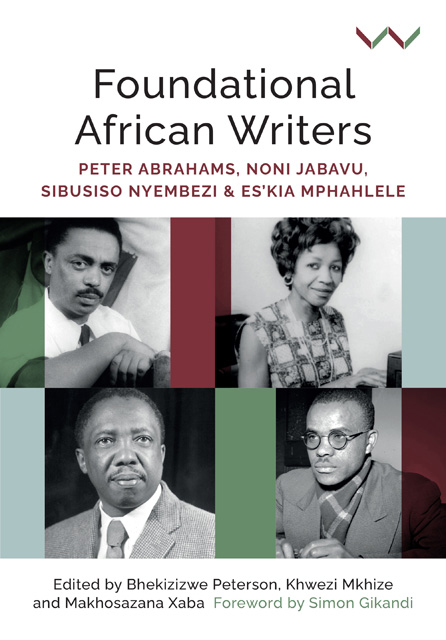Book contents
- Frontmatter
- Contents
- List of illustrations
- Foreword
- Acknowledgements
- Tribute to Professor Bhekizizwe Peterson
- Introduction
- Part I Remapping and Rereading African Literature and Cultural Production
- Part II South Africa and Fugitive Imaginaries
- Part III In the Eye of the Short Century: Diaspora and Pan-Africanism Reconsidered
- Contributors
- Index
6 - Noni Jabavu and the Sensibilities of Early Black Educated Elites
Published online by Cambridge University Press: 01 September 2022
- Frontmatter
- Contents
- List of illustrations
- Foreword
- Acknowledgements
- Tribute to Professor Bhekizizwe Peterson
- Introduction
- Part I Remapping and Rereading African Literature and Cultural Production
- Part II South Africa and Fugitive Imaginaries
- Part III In the Eye of the Short Century: Diaspora and Pan-Africanism Reconsidered
- Contributors
- Index
Summary
This news burst on us like the report of a cannon! … Our Tengo dead so young, in his last few months of becoming a trained doctor? Oh God-in-heaven! He who would have been a precious doctor for our people, our only Tengo, of-Tengo-the Professor who is in turn Tengo-of-the-grand-old-one u-Mhleli, Editor of our first newspaper-of-our-people-1884!
Set in the 1950s, Drawn in Colour: African Contrasts begins with the arrival of a telegram announcing the death of twenty-six-year-old Tengo, a medical student at the University of the Witwatersrand and the younger brother of the author, Noni Jabavu. As a twenty-first-century reader, I respond empathetically to how a sibling in faraway London would experience this announcement of the murder of their youngest sibling. Part of her parents’ plan in placing Noni Jabavu under the guardianship of an English family in England at the tender age of thirteen was because they also wished for her to become a medical doctor. Her departure to England was facilitated through family connections with a prominent colonial politician, Jan Smuts. These two facts suggest that her family valued women’s education, and that like most middleclass families, they used class-based networks to consolidate their social position. Here, networks appear to have operated across race. Reading about Tengo’s death and funeral jolts me into unfurling a longer canvas of history for thinking about black life. It is of course trite to point out that middle-class black life does not begin in 1994. But our social science scholarship is generally unable to imagine this life prior to the democratic transition. When it does extend further back than the 1990s, it is infused with the urge to flatten colonial and apartheid South Africa into an indistinct mass of working-class suffering. This reflex is contradicted by a close reading of Jabavu. Black literature from the mid-twentieth century is useful for the texture that it gives to this period and for the complexity that it lends to the historical arc of black life. For Alice Deck, Jabavu’s The Ochre People: Scenes from a South African Life avoids engaging in autobiographical observations that are monolithic or offered from a universal gaze. Instead, she favours personal irony, ‘multiple positions of personal anecdotes’ and generalised descriptions.
- Type
- Chapter
- Information
- Foundational African WritersPeter Abrahams, Noni Jabavu, Sibusiso Nyembezi and Es'kia Mphahlele, pp. 135 - 154Publisher: Wits University PressPrint publication year: 2022



